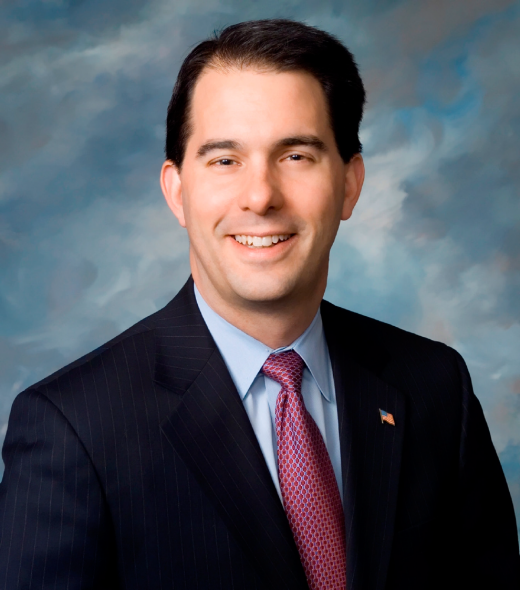Marquette Law School Poll finds Walker job approval down
Clinton leads presidential matchups; controversy over budget
MILWAUKEE – A new Marquette Law School Poll finds Gov. Scott Walker’s job approval rating has fallen to 41 percent, with 56 percent of registered voters in Wisconsin saying they disapprove of how he is handling his job as governor. In the previous poll, in October 2014, Walker’s approval among registered voters was 49 percent, with 47 percent disapproving.
To look ahead to a possible 2016 presidential matchup, former Secretary of State Hillary Clinton leads Walker in Wisconsin, 52 percent to 40 percent.
In a possible 2016 U.S. Senate race, former Sen. Russ Feingold has the support of 54 percent of registered voter, leading incumbent Sen. Ron Johnson, who has 38 percent, with 9 percent not expressing a preference.
“Election matchups at this point show us where candidates are lining up at the start of the race,” said Charles Franklin, professor of law and public policy and director of the Marquette Law School Poll. “The eventual outcome, of course, depends on how they actually run the course. Having an early picture allows us to measure how the campaign changes voters’ preferences over time.”
The poll interviewed 803 registered voters by landline and cell phone April 7-10. For the full sample, the margin of error is +/- 3.5 percentage points. For Republicans and independents who lean toward the Republican Party, the sample size is 319, with a margin of error of +/-5.6 percentage points. For Democrats and independents who lean toward the Democratic Party, the sample size is 391, with a margin of error of +/-5.1 percentage points.
Among Wisconsin Republicans and independents who lean toward the Republican Party, Walker leads as the choice for the GOP presidential nomination with 40 percent support, followed by Rand Paul at 10 percent, Jeb Bush at 8 percent, Ted Cruz and Chris Christie at 6 percent each, and Mike Huckabee and Ben Carson at 5 percent each. Marco Rubio is supported by 4 percent, with Bobby Jindal and Rick Santorum supported by 2 percent each. Rick Perry and Carly Fiorina receive less than 1 percent support each. Eleven percent do not express a preference among the candidates.
Among Democrats and independents who lean toward the Democratic Party, Hillary Clinton leads with 58 percent, followed by Elizabeth Warren with 14 percent, Joe Biden with 12 percent and Jim Webb and Martin O’Malley both with 1 percent support. Fourteen percent do not express a preference.
State of the state
Voters’ views of the direction of the state have taken a downturn since October. Fifty-three percent say that the state is now on the wrong track while 43 percent say the state is headed in the right direction. In October, 51 percent of registered voters said the state was headed in the right direction while 44 percent said it was on the wrong track.
Voters also see the state’s employment situation as turning down compared to other states, with 52 percent saying that Wisconsin is lagging behind other states in job creation, 34 percent saying that the state is doing about the same as other states and 8 percent saying that the state is creating jobs faster than other states. In October, 42 percent said the state was lagging, 38 percent said about the same and 13 percent said Wisconsin was creating jobs faster.
Opinion about the state’s budget situation has also turned more negative, with 38 percent saying the budget picture is worse than several years ago, 25 percent saying it is about the same and 33 percent saying it is better now. In October, 27 percent said the budget was worse, 23 percent about the same and 44 percent saying it was better than a few years ago.
Voters are opposed to a number of cuts proposed by the Walker budget. Seventy-eight percent oppose cutting $127 million from the K-12 public school budget, while 18 percent support the proposal. Seventy percent oppose cutting $300 million from the University of Wisconsin System budget; 26 percent support this.
Sixty percent oppose making the Natural Resources Board an advisory-only board, while 30 percent support that change.
Forty-four percent oppose requiring those on SeniorCare drug coverage to move into the Medicare Part-D program, while 30 percent support the requirement and 25 percent say they don’t have an opinion.
Fifty-one percent of registered voters say that they are willing for the state to borrow $1.3 billion for road construction, with 44 percent opposed. This is a striking contrast with the results of three earlier Marquette Law School polls in 2013 and 2014, in which borrowing to pay for highway projects was opposed by totals of 65 percent to 73 percent of those polled. However, in October 2013, when asked about borrowing $994 million for road construction, 49 percent favored borrowing while 44 percent opposed.
Bucks arena funding
Seventy-nine percent oppose borrowing about $150 million to support a new arena for the Milwaukee Bucks, with 17 percent supporting the proposal. In the Milwaukee media market, 67 percent oppose funding for an arena and 29 percent support it. Those views vary by less than 2 percentage points among the City of Milwaukee, the surrounding suburban counties of Waukesha, Ozaukee and Washington counties, and the seven other southeastern Wisconsin counties included in the media market.
In the rest of the state only 9 percent support borrowing for an arena, with 88 percent opposed.
Public schools
Forty-eight percent oppose the proposed elimination of state funding for tests based on the Common Core standards, while 35 percent favor the elimination of funding and 17 percent say they don’t have an opinion.
Voters strongly support continuing federally required testing in math and English, by 80 percent to 17 percent.
Asked if there should be a state agency to deal with low-performing schools or if parents’ choices were enough to improve school quality, 55 percent say parents’ choices are enough, while 36 percent say a state agency is needed.
Asked which is more important, reducing property taxes or increasing spending on public schools, 40 percent say reducing property taxes is more important while 54 percent say increasing spending on schools is more important. In March and May of 2013, 49 percent said reducing property taxes was more important and 46 percent said school funding was more important.
When it comes to the job public schools are doing, 25 percent say they are very satisfied with public schools in their community, 50 percent satisfied, 16 percent dissatisfied and 5 percent very dissatisfied. Among parents of school-age children, 32 percent are very satisfied, 45 percent satisfied, 17 percent dissatisfied and 5 percent very dissatisfied. Dissatisfaction is highest in the City of Milwaukee, where 47 percent are either dissatisfied or very dissatisfied while 49 percent are satisfied or very satisfied.
The Milwaukee sample is only 75 respondents, with a margin of error of +/- 12 percentage points, so it should be viewed with caution. However, pooling results over four polls since 2012 produces similar results based on 348 Milwaukee respondents, with a margin of error of +/-5.4 percentage points. For the four polls combined, 50 percent of Milwaukee respondents are dissatisfied or very dissatisfied, while 43 percent are satisfied or very satisfied. Other regions of the state show only modest variation in satisfaction with local public schools compared to the statewide results.
Vouchers
Fifty-four percent oppose removing limits on the number of students statewide outside Milwaukee and Racine counties receiving publicly funded vouchers to attend private schools, with 37 percent favoring ending the limit on vouchers, now set at 1,000 students. In September 2014, 18 percent supported removing all limits on vouchers, 21 percent supported increasing but not eliminating the limits, 19 percent favored keeping the 1,000-student limit and 38 percent would eliminate the statewide voucher program entirely. In previous polling in October 2013 and October 2014, support for expanding vouchers statewide beyond Milwaukee and Racine without mentioning limits was supported by 50 and 49 percent, with 44 percent opposed to expansion in both polls.
Right to work legislation
Voters were asked their view of the recently passed “right to work” legislation, with a question that provided two arguments frequently made by supporters of the legislation and two arguments frequently made by opponents. The order of supporting and opposing arguments was randomized, so that about half of respondents heard the supporting arguments first and about half heard the opposing arguments first. The question text was:
Recently the state adopted a “right to work” law that says workers in private companies cannot be required to pay union dues as a condition of employment. Supporters say the law will increase workers’ options to work where they wish and make Wisconsin more attractive for business. Opponents say the law will weaken unions and drive down pay scales for everyone. Do you support or oppose this new law?
Forty-four percent say they support the law while 50 percent say they oppose it, with 5 percent saying they don’t know.
Presidential campaign
Thirty-four percent of registered voters say that they would like to see Walker run for president while 62 percent would not like him to run. In October 2014, 26 percent wanted him to run and 68 percent did not. Among those who consider themselves either Republicans or independents leaning toward the Republican Party, 66 percent support a Walker presidential bid, with 29 percent opposed; in October 2014 just 44 percent favored a run with 48 percent opposed.
Asked whether any governor can run for president and still handle his or her duties as governor, 67 percent think that a governor cannot, with 29 percent saying that a governor can do both. Among Republicans and independents who lean Republican, 48 percent think a governor can do both and 48 percent say a governor cannot.
Clinton leads five potential Republican opponents in hypothetical 2016 matchups among registered voters. Clinton leads Paul 49-41, leads Bush 49-38, leads Walker 52-40, leads Rubio 50-38 and leads Cruz 52-36.
Favorability ratings
Sen. Johnson receives a 32 percent favorable and 29 percent unfavorable rating, with 39 percent saying they haven’t heard enough or don’t know. Sen. Tammy Baldwin receives a 39 percent favorable and 38 percent unfavorable rating, with 23 percent saying they haven’t heard enough or don’t know. In October 2014, Johnson was viewed favorably by 33 percent and unfavorably by 30 percent, with 36 percent unable to rate him. In October, Baldwin was viewed favorably by 36 percent and unfavorably by 37 percent with 26 percent unable to rate her.
Former Sen. Feingold is viewed favorably by 47 percent and unfavorably by 26 percent, with 26 percent unable to rate him. In October, 42 percent viewed him favorably and 30 percent unfavorably, with 27 percent unable to rate him.
President Barack Obama holds a 49 percent job approval rating with 47 percent disapproval. In October, 42 percent approved while 51 percent disapproved.
Favorability of potential presidential candidates
The favorability ratings for a number of potential presidential candidates were included in the poll. The ratings among partisans or independents who lean to a party are listed below.
Among Republicans and independents who lean toward the Republican Party:
Jeb Bush: Favorable 38%, unfavorable 26%, haven’t heard enough 32%, don’t know 4%
Chris Christie: Favorable 29%, unfavorable 38%, haven’t heard enough 29%, don’t know 5%
Ted Cruz: Favorable 30%, unfavorable 13%, haven’t heard enough 49%, don’t know 8%
Rand Paul: Favorable 46%, unfavorable 12%, haven’t heard enough 38%, don’t know 4%
Marco Rubio: Favorable 37%, unfavorable 8%, haven’t heard enough 47%, don’t know 8%
Scott Walker: Favorable 84%, unfavorable 15%, haven’t heard enough 1%, don’t know 1%
Among Democrats and independents who lean toward the Democratic Party:
Joe Biden: Favorable 73%, unfavorable 14%, haven’t heard enough 12%, don’t know 1%
Hillary Clinton: Favorable 76%, unfavorable 18%, haven’t heard enough 4%, don’t know 2%
Martin O’Malley: Favorable 5%, unfavorable 7%, haven’t heard enough 75%, don’t know 13%
Elizabeth Warren: Favorable 36%, unfavorable 7%, haven’t heard enough 52%, don’t know 5%
Party composition of the sample
In this poll, Republicans make up 24 percent of the registered voter sample with Democrats at 30 percent and independents at 40 percent.
Over all Marquette Law School Polls conducted in 2014, with 8,041 registered voters, Republicans totaled 26 percent while Democrats totaled 30 percent and independents 40 percent. In 2014, Republicans varied between 24 and 29 percent while Democrats varied between 28 and 32 percent. Independents varied between 37 and 44 percent.
About the Marquette Law School Poll
The Marquette Law School Poll is the most extensive statewide polling project in Wisconsin history. This poll interviewed 803 registered Wisconsin voters, by both landline and cell phone, April 7-10, 2015. The margin of error is +/- 3.5 percentage points for the full sample. For Republicans and independents who lean toward the Republican Party, the sample size is 319, with a margin of error of +/-5.6 percentage points. For Democrats and independents who lean toward the Democratic Party, the sample size is 391, with a margin of error of +/-5.1 percentage points. Republican and Democratic presidential primary items were asked of the corresponding party samples. The entire questionnaire, full results, and breakdowns by demographic groups are available at http://law.marquette.edu/poll.
NOTE: This press release was submitted to Urban Milwaukee and was not written by an Urban Milwaukee writer. While it is believed to be reliable, Urban Milwaukee does not guarantee its accuracy or completeness.
Mentioned in This Press Release
Recent Press Releases by Marquette University
New Marquette Law School Poll finds large majority of Wisconsin voters not yet tuned in to who is running in major 2026 elections
Oct 29th, 2025 by Marquette UniversityNo candidate has established strong position in public favorability in governor, state Supreme Court races; large majorities of voters undecided
New Marquette Law School National Survey Finds Large Majority Think Political Violence is a Big Problem, But With Sharp Partisan Differences
Oct 1st, 2025 by Marquette UniversityAmericans are overall pessimistic on reducing intense political conflict; half of those polled say heated language by leaders makes violence more likely
























Seems like Wisconsinites aren’t so thrilled with the idea of presidential candidate Walker, now are they? Guess casual voters don’t take kindly to being taken for SUCKERS, especially by someone who’s not really all that bright or sympathetic.
Even more remarkable was that this poll was taken before (mo)Ron Johnson got laughed out of that federal courtroom. Down 16 points to a known quantity candidate in RUSS? Ain’t enough Koch money to save that guy.
Hate to say we told you so. Maybe you shouldn’t vote for Republicans based on their track record, instead of being tricked by AM 620/1130 propaganda and TV ads. You’d think the Bush years would have taught these people something, but apparently they needed a refresher on how they roll, which Dubya-2 Walker is definitely giving.